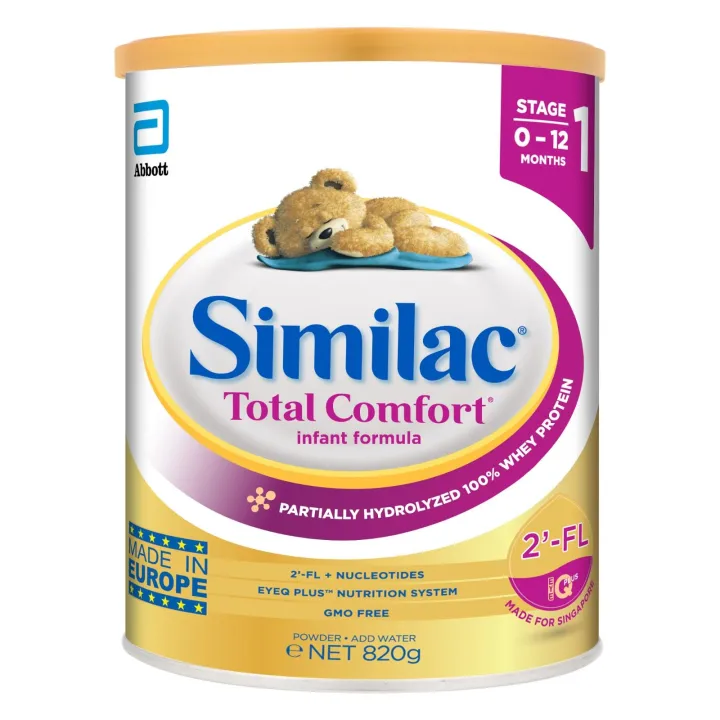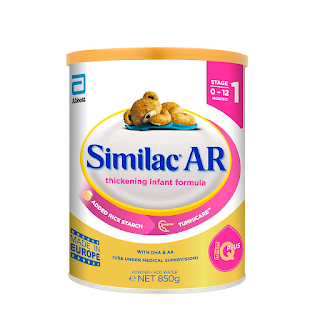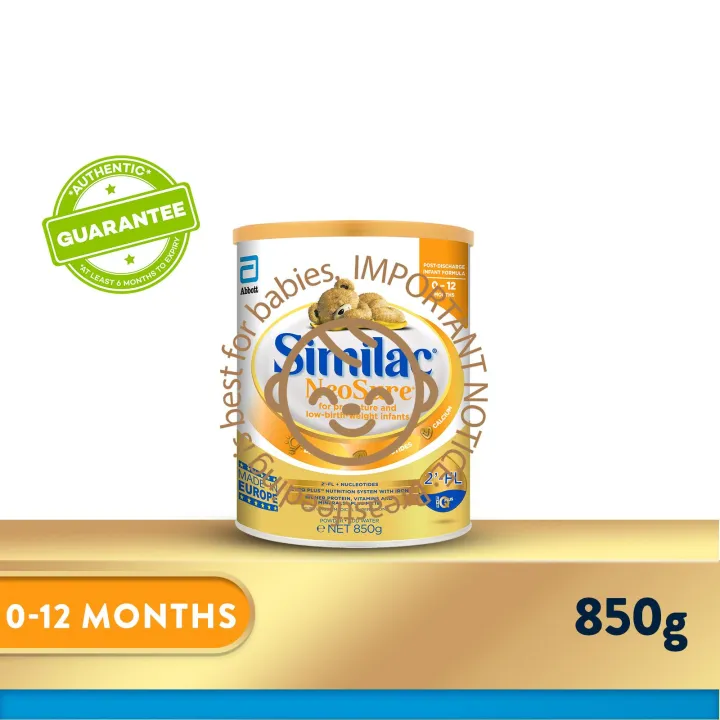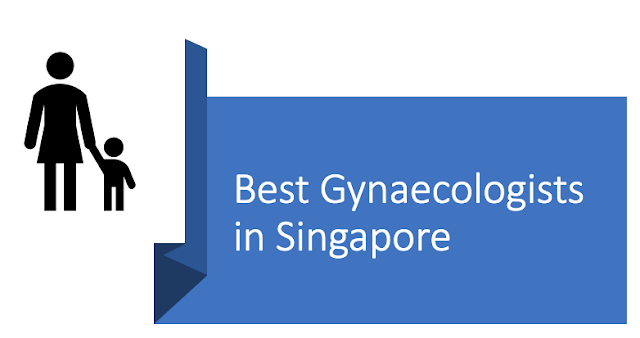Similac Singapore 2024 - Price and Reviews
With so many options and varieties, choosing a baby formula that's best for your child can be as difficult as it is important. Your decision on what to use will hinge on several factors, from your baby's health needs to cost, and many things in between. But most of all, it will depend on what your child will accept.
Breast milk or formula should be your baby's exclusive source of nutrition for the first six months of life and the primary source (supplemented with solid food) for the first year. If you formula feed, know your options so you can buy wisely.
In this article, we will the many milk formula options offered by Similac.
This means that every major brand, such as Enfamil, Similac, Gerber Good Start, or Earth's Best, plus all store brands from Walmart, Target, or Kroger, etc., are safe to use and will meet your baby's basic nutritional needs.
- Milk Proteins : Has whey and casein proteins
- Contains DHA & ARA
- Contains prebiotics and antioxidants
- Main Fat Source - Soy and Coconut Oil
B. Similac Milk Formulas for Sensitive Babies






Alert: Recall on Similac Formula 2022
Newborns should be fed either breast milk or infant formula on demand.
Breast Milk
For new-born babies, WHO advices to solely breastfeed for the first 6 months and then continue with additional nutritious foods up to 2 years old, based on you and your baby's needs. (Source)
Infant Formula Milk
In case breastfeeding doesn’t work or you choose not to breastfeed, infant formula is the only suitable alternative. It should be your baby’s only source of nutrition for the first 6 months. A formula-fed infant will drink every 3 - 4 hours and will increase as your baby grows.
According to NHS guidelines, cow’s milk and other substitutes should not be introduced as a main drink until after 1 year. Never start solids before 4 months. Source
Always seek medical advice before buying infant formula.
Water - NOT Recommended
[Source]
It is recommended that you do not give babies under six months of age water. Until your little one is six months they should receive only breastmilk or formula.
Here are some of the common consequences of introducing water to babies too early..
- Lack of nutrients from milk or formula
- Slower weight gain and decreased development
- Weaker immunity
- Potential of reduced breast milk supply
- Water intoxication
For more information, check out When Can Babies Drink Water
4-6 Months Old
Most babies are ready to start solids around 5 - 6 months old.
Some signs that show they are ready include..
- Mastering the grabbing skill
- Developing head and neck control
- Losing the tongue-thrust mechanism that automatically pushes food out of their mouth. N
Aim to feed about 1-2 tablespoons of food twice a day to your baby. Solid food shouldn't replace milk as the main source of nutrients.
2. 6-12 months - Stage 2
At 6 months, parents will usually introduce more foods into their baby’s diet, so the amount of milk they will need will gradually decrease. For both formula-fed and breastfed babies, the amount of milk they drink should naturally adjust according to how much food they have eaten.
However, for babies 6 to 9 months old, most of their calories should still come from breast milk or formula. Don’t stress about getting them to eat bite after bite of solid food. Feed up to two meals daily (or once every couple of days for some babies), with each meal 2 to 4 tablespoons.
Suitable baby foods include iron-fortified single-grain baby cereal along with pureed vegetables, fruits, and meats. You can also try offering finger foods like cut vegetables, fruit, yogurt and cheese. However, try not to introduce more than one food at a time to identify possible allergies or digestive problems.
Water can be introduced in small amounts with meals. It is generally advised not to give your baby more than 100ml to 150ml a day. As they age, you may start introducing more water with the help of sippy cups and straws.
For a more detailed guide on introducing water to your baby, do check out When Can Babies Drink Water .
If they seem to have an endless appetite or don’t seem to be eating enough, contact your child specialist.
9-12 Months Old
At this age, about half of your baby’s calories may usually come from food and the other half from breast milk or formula.
Babies these age are usually interested in trying new foods, so you can try to give them small pieces of your own meals. If they want more, give them more, but if they push it away, maybe that item is just not their one of their favourites.
Babies like to play with their food, so you can try using yogurt, cheese or oats as a sauce for vegetables or whole-grain crackers. Just remember to cut the foods properly and to avoid hard pieces to prevent choking.
3. 12 months onwards - Stage 3
Summary : Feed breast milk, dairy milk (cow / goat / etc), alternative plant based milk (soy), more soft / semi solid foods. Seek medical advice before feeding non breast milk alternatives.
Children will usually start to eat larger, more regular meals and get most of their nutrition from foods other than milk. WHO recommends that babies continue to be breast fed up to 2 years and beyond, but they may begin to need less breast milk as they eat more food.
After 12 months, your baby may not need formula milk anymore as they can start drinking cow’s milk and other alternatives more regularly.
Below are some of the main types of milk that may be given at this stage.
Cow’s Milk - For children under 2, choose full-fat cow’s milk. Semi-skimmed doesn’t have the same nutrient profile in terms of vitamins and minerals and has less energy.
Goat’s / Sheep’s Milk - Their nutrient profiles are similar to cow’s milk so as long as they’re pasteurised, they’re alright to offer.
Soya Drinks & Other Milk Alternatives - As part of a healthy, balanced diet, soya, oat, almond and other vegetable based milks can be offered or used in cooking. However, they are usually not as nutritionally comparable to cow’s milk. Furthermore, not all brands fortify with the same nutrients.
2 years and above
Summary : Feed cow's milk or alternative, and a balanced diet. Formula milk as an addition if the child is not receiving enough nutrients.
Children will start to eat a more varied, balanced diet and may rely less on milk. You may adjust how much milk you give them based on their diet throughout the week. If your child's diet doesn’t include dairy, you should consider how you can replace any nutrients they might be missing out on, such as formula milk or alternative foods.
Sources
Breast milk or formula should be your baby's exclusive source of nutrition for the first six months of life and the primary source (supplemented with solid food) for the first year. If you formula feed, know your options so you can buy wisely.
In this article, we will the many milk formula options offered by Similac.
All Formula Brands Are Safe
It's always helpful to ask your child's pediatrician for specific recommendations, but generally speaking, all baby and infant formula brands sold in the United States—generic or brand-name—are safe to use. Every formula is regulated by the U.S. Food and Drug Administration (FDA) and must meet the minimum nutritional requirements of the Federal Food, Drug and Cosmetic Act (the "Infant Formula Act").This means that every major brand, such as Enfamil, Similac, Gerber Good Start, or Earth's Best, plus all store brands from Walmart, Target, or Kroger, etc., are safe to use and will meet your baby's basic nutritional needs.
General Nutritional Information
Similac generally is a cow milk-based, lactose-containing formula enriched with iron, vitamins, and other minerals.- Milk Proteins : Has whey and casein proteins
- Contains DHA & ARA
- Contains prebiotics and antioxidants
- Main Fat Source - Soy and Coconut Oil
Similac has one of the widest range of milk powders in Singapore.
For example, Similac Total Comfort is designed for babies with digestive problems like constipation, tummy aches, gas and diarrhea. Similac Total Comfort is a specialized formulation featuring 100% partially hydrolysed whey protein as part of its TummiCare™ EZ Digest nutrition system. It also contains a TummiCare™ Nutrition System designed for nutrient absorption with a gentle touch. It is also 98% lactose free.
Similac AR is a lactose-free formula containing added rice starch, that is suitable for babies with frequent spit-up.
Similac Neosure is a formula specifically designed for premature or low birth weight babies.
Isomil is a soy formula suitable for babies who cannot take milk formula.
Similac Mum is a milk formula for pregnant mothers and breastfeeding mothers. It is designed to help mothers meet their increased nutritional needs.
For example, Similac Total Comfort is designed for babies with digestive problems like constipation, tummy aches, gas and diarrhea. Similac Total Comfort is a specialized formulation featuring 100% partially hydrolysed whey protein as part of its TummiCare™ EZ Digest nutrition system. It also contains a TummiCare™ Nutrition System designed for nutrient absorption with a gentle touch. It is also 98% lactose free.
Table of Contents
A. General Similac Milk Formulas
1. Similac 5MO Milk Formula (Stage 1-4)
B. Similac Milk Formulas for Sensitive Babies
2. Similac Total Comfort (Stage 1-3) - Hypoallergenic & Lactose Free Milk Formula
3. Similac® AR Thickening Infant Formula (Stage 1)
4. Abbott Similac Isomil Plus, Soy-Based Formula (For Kids)
C. Similac Milk Formulas for Premature Babies
5. Similac Neosure With 2'Fl Special Infant Milk Formula (Stage 1)
D. Similac Milk for Pregnant and Breastfeeding Mothers
6. Similac Mum
Similac Singapore 2024 - Price and Reviews
1. Similac 5MO Milk Formula (Stage 1-4)

- IMMUNIFY® ingredients with a blend of 5 milk oligosaccharides (MO)- 2’-FL, 3-FL, LNT, 3’-SL, 6’-SL
- EyeQ Plus™ Nutrition System that contains DHA and AA
- With added nucleotides
- Non-GMO (genetically modified organisms) ingredients
Similac 5MO Milk Formula - Product Range
- Stage 1 Infant (0-12 months)
- Stage 2 Follow-On (6 months onwards)
- Stage 3 Growing-Up (1 year onwards)
- Stage 4 Kid Pre-school (3 years onwards)
Similac 5MO Milk Formula Price
Stage 1 - Infant
400g >> SGD32.60 on Shopee
850g >> SGD66 on Shopee
Stage 2 - Follow On
1.8kg >> SGD120 on Shopee
Stage 3 - Growing Up
850g >> SGD49.55 on Shopee
1.8kg >> SGD99.05 on Shopee
Stage 4 - Kid Pre-school Milk
850g >> SGD43.95 on Shopee
1.8kg >> SGD80 on Shopee
2. Similac Total Comfort (Stage 1-3) - Hypoallergenic & Lactose Free Milk Formula

This growing-up milk is suitable for children with colic, fussiness, gas, spit-up, constipation, and diarrhea due to lactose sensitivity.
- TummiCare™ Nutrition System: Designed for nutrient absorption with a gentle touch.
- Similac Total Comfort is now improved with 2’-FL, together with nucleotides as part of Immunify® ingredients.
- EyeQ Plus Nutrition System: Contains Natural Vitamin E, Lutein; and DHA that supports brain and eye development.
- No Palm Oil: A unique vegetable fat blend.
Similac Total Comfort Formula Product Range
- Stage 1 Infant (0-12 months)
- Stage 2 Follow-On (6 months onwards)
- Stage 3 (1 year onwards)
Similac Total Comfort Formula Price
Stage 1 (Up to 6 months)
820g >> SGD78.60 on Shopee
Stage 2 (6-12 months)
820g >> SGD72.55 on Shopee
Stage 3 (1 year onwards)
820g >> SGD63.50 on Shopee
3. Similac® AR Thickening Infant Formula (Stage 1)

Similac AR is formulated with added rice starch to help keep the formula in your baby's tummy. Because it naturally thickens in the stomach, it means your baby is clean, happy and full. Similac AR is gentle on tiny tummies.
- Similac AR is a lactose-free formula containing added rice starch, that is suitable for babies with frequent spit-up.
- With EyeQ Plus nutrients; contains AA and DHA that are building blocks for brain and eye development
- Unique vegetable fat blend with no palm oil, improves absorption of DHA, AA; and calcium for strong bones and teeth.
- Made in Spain.
Similac® AR Thickening Formula Price
4. Abbott Similac Isomil Plus, Soy-Based Formula

Isomil a growing up soy milk powder formula is designed for children with special feeding needs between 1 to 10 years suffering from lactose intolerance and cow milk protein sensitivity. It is also suitable for vegetarians.
It is milk free, lactose free and cow's milk protein free.
- Duocarb advantage: Special blend of two carbohydrates with different absorptive pathways
- EyeQ Plus Nutrition System: Contains Natural Vitamin E, Lutein; and DHA that supports brain and eye development
- Unique vegetable fat blend with No Palm Oil
Abbott Similac Isomil Plus Price
5. Similac Neosure With 2'Fl Special Infant Milk Formula

Similac Neosure for premature and low-birth-weight infants.
Breast milk is the best for babies. The World Health Organization recommends exclusive breastfeeding for the first six months of life. Unnecessary introduction of bottle feeding or other food and drinks will have a negative impact on breastfeeding.
After six months of age, infants should receive age-appropriate foods while breastfeeding continues for up to two years of age or beyond. Consult your doctor before deciding to use infant formula or if you have difficulty breastfeeding. Formulated for premature and low-birth-weight infants.
- 2’-FL + Nucleotides
- EyeQ Plus™ Nutrition System with iron
- Higher Protein, Vitamins and Minerals; plus MCTs Use under medical supervision
Similac Neosure Milk Formula
- Stage 1 Infant (0-12 months)
Similac Organic Milk Formula Price
Stage 1 (0-12 months)
850g >> SGD66.60 on Shopee
6. Abbott Similac Mum

- Similac Mum is available in 2 flavours, vanilla and strawberry yoghurt.
- Similac Mum is the lowest in fat and the most complete* maternal milk with 27 essential vitamins and minerals, and prebiotic (FOS).
- Similac Mum is the maternal milk that is scientifically studied among pregnant and breastfeeding mothers. Similac Mum now has an improved EyeQ Plus nutrition system with Natural Vitamin E & Lutein, along with DHA, a building block for your baby’s brain & eyes.
- Similac Mum is also a low GI maternal milk that is suitable for pregnant women with gestational diabetes.
Similac Mum Price
900g >> SGD34.10 on Shopee
References
https://aptparenting.com/nestle-vs-similac-vs-enfamilAlert: Recall on Similac Formula 2022
Baby Nutrition Guide
1. 0-6 months - Stage 1Newborns should be fed either breast milk or infant formula on demand.
Breast Milk
For new-born babies, WHO advices to solely breastfeed for the first 6 months and then continue with additional nutritious foods up to 2 years old, based on you and your baby's needs. (Source)
Infant Formula Milk
In case breastfeeding doesn’t work or you choose not to breastfeed, infant formula is the only suitable alternative. It should be your baby’s only source of nutrition for the first 6 months. A formula-fed infant will drink every 3 - 4 hours and will increase as your baby grows.
According to NHS guidelines, cow’s milk and other substitutes should not be introduced as a main drink until after 1 year. Never start solids before 4 months. Source
Always seek medical advice before buying infant formula.
[Source]
It is recommended that you do not give babies under six months of age water. Until your little one is six months they should receive only breastmilk or formula.
Here are some of the common consequences of introducing water to babies too early..
- Lack of nutrients from milk or formula
- Slower weight gain and decreased development
- Weaker immunity
- Potential of reduced breast milk supply
- Water intoxication
For more information, check out When Can Babies Drink Water
4-6 Months Old
Most babies are ready to start solids around 5 - 6 months old.
Some signs that show they are ready include..
- Mastering the grabbing skill
- Developing head and neck control
- Losing the tongue-thrust mechanism that automatically pushes food out of their mouth. N
Aim to feed about 1-2 tablespoons of food twice a day to your baby. Solid food shouldn't replace milk as the main source of nutrients.
2. 6-12 months - Stage 2
At 6 months, parents will usually introduce more foods into their baby’s diet, so the amount of milk they will need will gradually decrease. For both formula-fed and breastfed babies, the amount of milk they drink should naturally adjust according to how much food they have eaten.
However, for babies 6 to 9 months old, most of their calories should still come from breast milk or formula. Don’t stress about getting them to eat bite after bite of solid food. Feed up to two meals daily (or once every couple of days for some babies), with each meal 2 to 4 tablespoons.
Suitable baby foods include iron-fortified single-grain baby cereal along with pureed vegetables, fruits, and meats. You can also try offering finger foods like cut vegetables, fruit, yogurt and cheese. However, try not to introduce more than one food at a time to identify possible allergies or digestive problems.
Water can be introduced in small amounts with meals. It is generally advised not to give your baby more than 100ml to 150ml a day. As they age, you may start introducing more water with the help of sippy cups and straws.
For a more detailed guide on introducing water to your baby, do check out When Can Babies Drink Water .
If they seem to have an endless appetite or don’t seem to be eating enough, contact your child specialist.
9-12 Months Old
At this age, about half of your baby’s calories may usually come from food and the other half from breast milk or formula.
Babies these age are usually interested in trying new foods, so you can try to give them small pieces of your own meals. If they want more, give them more, but if they push it away, maybe that item is just not their one of their favourites.
Babies like to play with their food, so you can try using yogurt, cheese or oats as a sauce for vegetables or whole-grain crackers. Just remember to cut the foods properly and to avoid hard pieces to prevent choking.
3. 12 months onwards - Stage 3
Summary : Feed breast milk, dairy milk (cow / goat / etc), alternative plant based milk (soy), more soft / semi solid foods. Seek medical advice before feeding non breast milk alternatives.
Children will usually start to eat larger, more regular meals and get most of their nutrition from foods other than milk. WHO recommends that babies continue to be breast fed up to 2 years and beyond, but they may begin to need less breast milk as they eat more food.
After 12 months, your baby may not need formula milk anymore as they can start drinking cow’s milk and other alternatives more regularly.
Below are some of the main types of milk that may be given at this stage.
Cow’s Milk - For children under 2, choose full-fat cow’s milk. Semi-skimmed doesn’t have the same nutrient profile in terms of vitamins and minerals and has less energy.
Goat’s / Sheep’s Milk - Their nutrient profiles are similar to cow’s milk so as long as they’re pasteurised, they’re alright to offer.
Soya Drinks & Other Milk Alternatives - As part of a healthy, balanced diet, soya, oat, almond and other vegetable based milks can be offered or used in cooking. However, they are usually not as nutritionally comparable to cow’s milk. Furthermore, not all brands fortify with the same nutrients.
2 years and above
Summary : Feed cow's milk or alternative, and a balanced diet. Formula milk as an addition if the child is not receiving enough nutrients.
Children will start to eat a more varied, balanced diet and may rely less on milk. You may adjust how much milk you give them based on their diet throughout the week. If your child's diet doesn’t include dairy, you should consider how you can replace any nutrients they might be missing out on, such as formula milk or alternative foods.
Sources
https://www.srnutrition.co.uk/2019/08/milk-recommendations-for-infants-toddlers/
https://www.aptaclub.de/en/baby/which-milk-should-i-use-and-when.html
https://www.who.int/nutrition/topics/infantfeeding_recommendation/en/
https://www.nhs.uk/conditions/baby/weaning-and-feeding/drinks-and-cups-for-babies-and-young-children/
https://www.aptaclub.de/en/baby/which-milk-should-i-use-and-when.html
https://www.who.int/nutrition/topics/infantfeeding_recommendation/en/
https://www.nhs.uk/conditions/baby/weaning-and-feeding/drinks-and-cups-for-babies-and-young-children/
Related
Milk Brands in Shopee Singapore
All Infant Formulas
All Milk Formulas for 1 Year Old and Above
Abbot Grow Milk Formula Singapore / Stages 1 - 5
Anmum / Materna for pregnant mums, Lacta for breastfeeding mums, Essential Stage 3 and 4 Toddler Formula
Bellamy's Milk Formula Singapore / Organic, Stage 1 to 4, Pregnancy Milk
Bubs Organic Milk Formula Singapore / Organic, Grass fed or goat milk options, Stage 1 to 3
Enfamil Milk Formula Singapore / Stage 1 and 2
- Gentlease for digestion problems / Post discharge for newborns
- Enfamil AR (anti regurgitation) for acid reflux and spit up
- Lactofree lactose free / Nutramigen hypoallergenic lactose free
Enfagrow Milk Formula Singapore / Stage 3 to Stage 5, Has Gentlease Option
Dutch Lady / 123, 456, Maxgro
Friso Milk Formula Singapore / Stage 1 to 4
- Comfort Next for constipation / AR thickened formula to reduce spit up
- HA hydrolyzed formula for cow's milk protein allergy / Has Frisomum pregnancy and lactation formula
Holle Milk Formula Singapore / Organic + Organic Goat Milk Option, Stage 1 to 3
HIPP Milk Formula Singapore / Organic, Combiotik option has prebiotics, Stage 1 to 4
Isomil Milk Formula Singapore / Soy Formula, Stage 1 and Stage 3
Karihome Milk Formula Singapore / Goat milk, Stage 1 to 4
Kendamil Milk Formula Singapore / Organic + Goat Milk Option, Stage 1 to 3
Lactogen Milk Formula Singapore / Stage 1 to 3
Nature One Dairy Milk Formula Singapore / Standard, Premium (More DHA, ARA, GOS, Lutein) and Organic Formulas, Stage 1 to 4, + Pregnancy formula
Nestle Nan / Optipro, Supremepro, HA (Hypoallergenic), Sensitive, Lactose free
Pediasure Milk Formula Singapore / For children 1-12 years old, Has sucrose free option
Wyeth S26 Milk Formula Singapore / Stage 1 to 4, Ascenda for growth (1 to 7 years old)
Similac Milk Formula Singapore / Total Comfort for sensitive stomachs, RS for anti regurgitation, Neosure for premature babies, Has organic option, Stage 1 to 4






Comments
Post a Comment